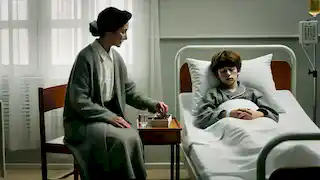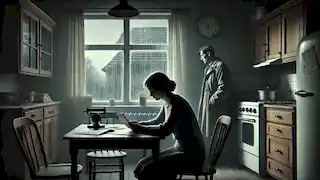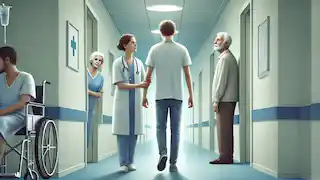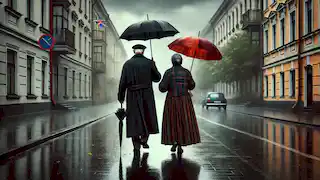On the day of her son’s birthday, a sobbing woman told her husband that they should take him home from the sanatorium. Her face was frail and white, her eyes deep set and blurred by tears, their dim color never quite restored to what they had once been. The old man, her husband, walked around the room aimlessly, preoccupied by what his wife had just said but without answering her. He was a quiet man, of few words, who preferred to absorb the world around him in silence, rather than with conversation.
It had rained all morning. The heavy clouds hovered over the city as the couple dressed and prepared to visit their son, who was, at that time, residing in a mental hospital. The boy had been placed there after years of illness—a sickness of the mind. The woman’s maternal heart never quite accepted it, always wrestling with the idea that her son was not fit for the world.
They had moved to this nameless city, escaping their old lives and trying to find solace in the anonymity of their new surroundings. The couple lived in a small apartment filled with knick-knacks from the past, objects that seemed like artifacts of a life they no longer lived but couldn’t let go of. The son had been sent to the sanatorium five years ago, and though he was now an adult, they treated him like a child—because to them, he still was.
The woman's mind wandered as she brushed a coat of soft powder onto her pale cheeks. Memories flooded back: the sleepless nights, the episodes of panic, the days when their son would refuse to speak, and the days when his words made no sense at all. A doctor had told them it was a kind of madness—one with no cure, no reprieve, and no understanding. It was as though their son was trapped in a world where everything was a symbol, a sign, and nothing was clear or straightforward.
"Ready?" her husband asked quietly, standing by the door, looking down at his shoes.
She nodded and joined him, taking his arm as they left the apartment. The rain had lightened into a soft drizzle, the cold droplets falling like whispers from the sky. Together, they made their way to the train station, not speaking during the journey. The train ride was uneventful, the passengers around them all consumed in their own worlds—heads buried in newspapers, eyes cast down at their laps.

Once they arrived at the sanatorium, they found themselves walking through hallways that seemed to echo with their footsteps. They reached the familiar door and entered. Their son, a pale and gaunt figure, lay on his bed, staring at the ceiling. He did not react to their presence, and they stood there for a moment, waiting for some acknowledgment that never came.
"He’s had a rough night," the nurse explained softly. "He hasn't spoken a word since morning."
The mother approached her son and gently touched his hand, which remained limp and unresponsive. She whispered his name, but there was no reply. The father stood awkwardly by the door, not knowing how to approach his son or comfort his wife.
After some time, the mother took out a small box she had brought with her. Inside was a collection of delicately wrapped candies—her son’s favorite when he was a child. She placed it on the nightstand beside his bed. "Happy birthday," she whispered, tears welling in her eyes.

The son turned his head slightly, his gaze shifting to the box. His lips moved ever so slightly, but no words escaped. It was as if the meaning of the gesture—the act of giving him something familiar—was lost in the labyrinth of his mind. His world was one of signs and symbols, where everything around him took on a deeper meaning that only he could understand, but none of it connected in any coherent way.
The visit did not last long. The son remained in his dazed state, barely acknowledging their presence. The nurse returned to inform them that it was time to leave, and the parents reluctantly said their goodbyes. The mother leaned down to kiss her son on the forehead, her lips brushing against his cold skin. The father gave a brief, awkward wave before turning to leave the room.
As they made their way back home, the couple did not speak. The mother, still emotional from the visit, stared out the window of the train, her mind swirling with thoughts of her son. The father sat beside her, his hands folded neatly in his lap, his face blank but his mind racing with memories and regrets.
Back in their small apartment, the silence continued. The ticking of the clock on the wall seemed louder than usual, filling the space with an uncomfortable rhythm. The mother sat down at the kitchen table and began to sort through the mail that had been left on the counter. Bills, advertisements, letters—they all seemed insignificant in the face of what they had just experienced.
The phone rang, breaking the silence. The mother hesitated for a moment before answering it. On the other end of the line was the doctor from the sanatorium. His voice was calm but serious.
"I'm afraid there's been an incident," he said. "Your son attempted to harm himself shortly after you left. We were able to intervene, but we believe it would be best if you came back in the morning."
The mother’s hand shook as she held the phone, her heart pounding in her chest. She couldn’t speak, couldn’t form the words to respond.
"We'll be there," the father said, taking the phone from her hand. He hung up and looked at his wife, his face pale and drawn.
They didn’t go back that night. They sat together in the dimly lit kitchen, their minds numb, their bodies exhausted from the weight of their son’s illness. They knew there was nothing they could do, no way to fix what was broken. They were trapped, just like their son, in a world of signs and symbols that they could never fully understand.

The next morning, they returned to the sanatorium, their steps heavy and slow. When they arrived, the doctor met them at the door and led them to their son’s room. He was sitting up in bed, his hands resting in his lap, his eyes distant and unfocused.
"He’s stable now," the doctor explained. "But we need to monitor him closely. His condition is delicate."
The mother sat down beside her son, reaching for his hand. This time, he squeezed her fingers gently, a faint glimmer of recognition in his eyes.
For a brief moment, she felt a flicker of hope—hope that maybe, just maybe, her son was still in there somewhere, beneath the layers of madness and confusion. But as quickly as it appeared, the hope vanished, replaced by the cold reality of their situation.
They stayed with him for a while, sitting in silence, until the nurse came to take him for his medication. As they watched their son being led away, the parents shared a glance—a look that spoke of love, of loss, and of resignation.
They left the sanatorium for the last time that day, knowing that they could never truly bring their son home. His mind was lost in a maze of signs and symbols, and they were powerless to lead him out.
The rain had started again by the time they reached their apartment. The mother sat by the window, watching the drops fall and disappear against the glass. The father paced the room, his footsteps muffled by the thick carpet. Neither of them spoke, but the silence between them was filled with the weight of everything they could not say.
In the corner of the room, the clock ticked on, marking the passage of time. Each second felt heavier than the last, as if the weight of their grief had seeped into the very air around them. And yet, life continued, indifferent to their suffering. The world outside moved on, while they remained trapped in the stillness of their own sorrow.
They did not know what the future would bring. They did not know if their son would ever recover, or if they would spend the rest of their lives visiting him in that sterile room, watching him fade further and further away. All they knew was that they loved him, and that love, as deep and unwavering as it was, could not save him.
And so, they waited—waited for the next phone call, the next visit, the next reminder that their son was lost in a world they could never understand. A world of signs and symbols, where nothing was as it seemed.




















